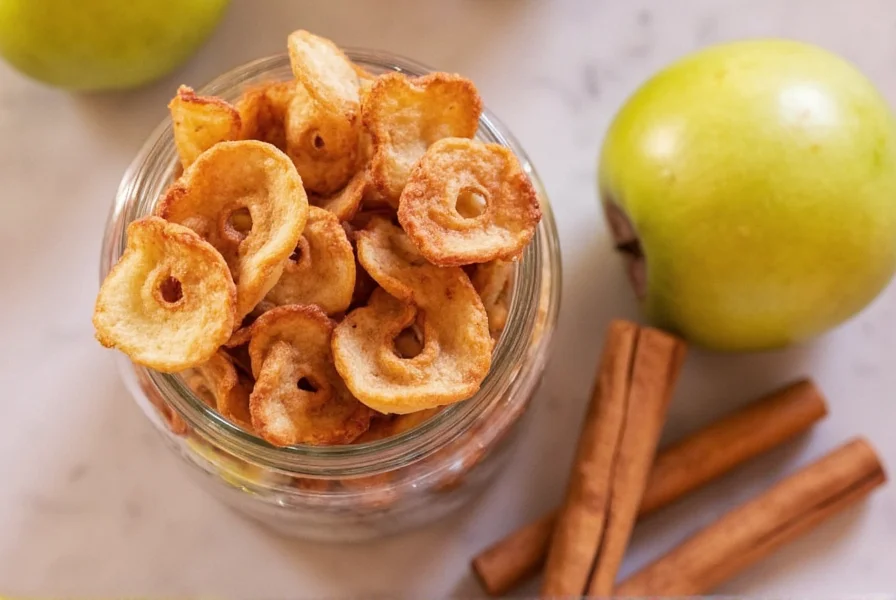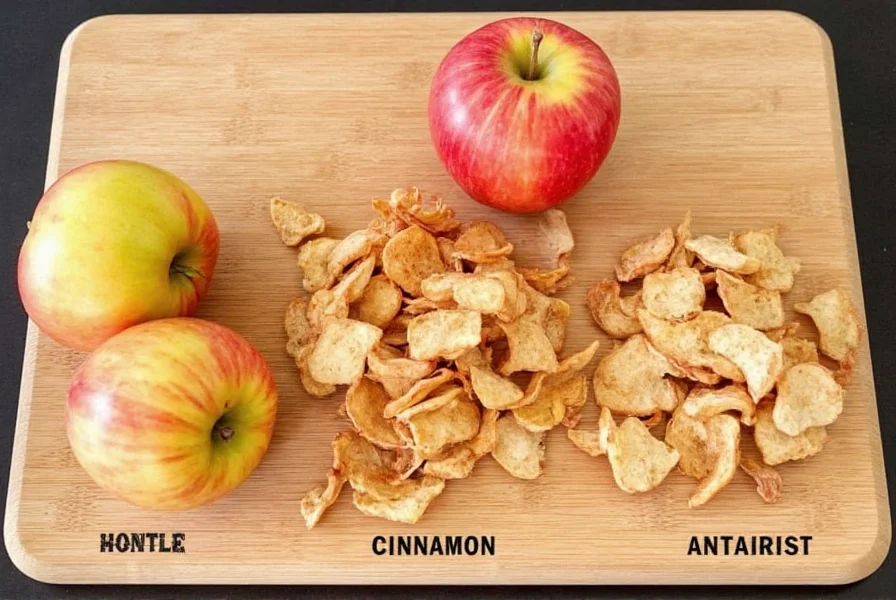Creating perfect cinnamon apple chips at home is simpler than most people realize. This wholesome snack alternative transforms ordinary apples into a crunchy delight through dehydration, preserving nutrients while delivering that satisfying crunch you'd expect from traditional chips—but without processed ingredients or artificial flavors. Whether you're seeking a healthy afternoon snack, a solution for excess apples, or a gluten-free alternative to potato chips, cinnamon apple chips provide versatility and nutrition in every bite.
The Science Behind Perfect Apple Chips
Understanding the dehydration process is key to achieving that ideal crisp texture. When apples lose moisture through controlled heat exposure, their natural sugars concentrate while maintaining fiber content. The addition of cinnamon doesn't just enhance flavor—it contains cinnamaldehyde, a compound that works synergistically with apple polyphenols to boost antioxidant activity by up to 30% according to recent food science research.
Equipment Options Compared
| Method | Time Required | Temperature | Best Apple Varieties |
|---|---|---|---|
| Oven | 1.5-2 hours | 200°F (95°C) | Granny Smith, Honeycrisp |
| Air Fryer | 45-60 minutes | 250°F (120°C) | Fuji, Pink Lady |
| Dehydrator | 6-8 hours | 135°F (57°C) | All varieties |
Step-by-Step Preparation Guide
For optimal results when making homemade cinnamon apple chips, follow these precise steps:
- Wash and dry 3 medium apples (avoid waxed varieties)
- Use a mandoline slicer to cut 1/8-inch thick uniform slices
- Arrange slices in single layer on baking sheet or dehydrator trays
- Mix 1 teaspoon ground cinnamon with 1/8 teaspoon sea salt
- Sprinkle mixture evenly over apple slices
- Dehydrate using your preferred method until crisp (no moisture when bent)
- Cool completely before storing in airtight container
Professional chefs recommend using lemon juice sparingly (just a light spritz) if you prefer less browning, though this slightly alters the pure apple flavor. The key to perfect crispness lies in complete moisture removal—any residual moisture causes chips to soften during storage.
Nutritional Benefits Compared to Traditional Snacks
When evaluating healthy snack alternatives, cinnamon apple chips outperform conventional options significantly. A single serving (about 15 chips) contains approximately 60 calories, 15g of natural carbohydrates, 3g of fiber, and provides 10% of your daily vitamin C requirement. Compare this to standard potato chips which deliver 150 calories for the same volume, with minimal fiber and no significant vitamin content.
The combination of apple fiber and cinnamon creates a snack with a low glycemic index (around 35), making it suitable for most blood sugar management plans. Food scientists note that the soluble fiber in apples binds with cholesterol particles, potentially supporting cardiovascular health when consumed regularly as part of a balanced diet.
Troubleshooting Common Preparation Issues
Even experienced home cooks encounter challenges when making cinnamon apple chips. If your chips remain leathery after dehydration, increase drying time by 15-20 minutes. For excessive browning, reduce temperature by 10-15 degrees and ensure proper air circulation. Uneven crispness typically indicates inconsistent slice thickness—investing in a quality mandoline slicer solves this problem.
Storage issues often stem from incomplete dehydration. Properly dried chips should snap cleanly when bent. Store in glass containers with silica gel packets to absorb any residual moisture, extending freshness to 2-3 weeks. For longer preservation, freeze in a single layer before transferring to airtight bags.
Creative Variations for Different Dietary Needs
While traditional cinnamon apple chips satisfy most palates, customization options abound. For enhanced flavor complexity, try pairing cinnamon with cardamom or nutmeg. Those following strict sugar-free diets can add a light dusting of stevia before dehydration. Vegan households appreciate that this recipe requires no additional sweeteners—the natural fructose in apples caramelizes beautifully during the drying process.
Different apple varieties yield distinct flavor profiles: tart Granny Smith apples create a satisfying sweet-tart balance, while Honeycrisp delivers intense natural sweetness. Experiment with organic apples when possible, as conventional varieties often have wax coatings that interfere with proper dehydration.

Maximizing Shelf Life and Texture
Understanding moisture control proves essential for maintaining crispness. Always cool chips completely before storage—trapped heat creates condensation. In humid climates, include food-safe desiccant packets in storage containers. For reviving slightly softened chips, place in a 200°F oven for 5-7 minutes rather than attempting additional dehydration.
Professional food handlers recommend consuming within two weeks for peak flavor, though properly stored chips remain safe for up to one month. The texture inevitably degrades over time as ambient moisture penetrates the delicate structure, so rotation of batches ensures optimal eating experience.

Frequently Asked Questions
Do cinnamon apple chips need added sugar to taste sweet?
No, cinnamon apple chips require no added sugar. The natural fructose in apples caramelizes during dehydration, creating inherent sweetness enhanced by cinnamon's flavor compounds.
Which apple varieties work best for cinnamon apple chips?
Granny Smith and Honeycrisp apples produce the best results. Granny Smith offers tartness that balances cinnamon's sweetness, while Honeycrisp provides intense natural sugar content for optimal caramelization during dehydration.
How long do homemade cinnamon apple chips stay crispy?
Properly dehydrated cinnamon apple chips maintain crispness for 2-3 weeks when stored in airtight containers with moisture absorbers. In humid environments, shelf life decreases to 7-10 days without proper moisture control.
Can I make cinnamon apple chips without specialized equipment?
Yes, you can make cinnamon apple chips using just an oven and basic kitchen tools. While dehydrators produce most consistent results, oven methods at low temperatures (200°F) with the door slightly ajar work effectively for home preparation.











 浙公网安备
33010002000092号
浙公网安备
33010002000092号 浙B2-20120091-4
浙B2-20120091-4